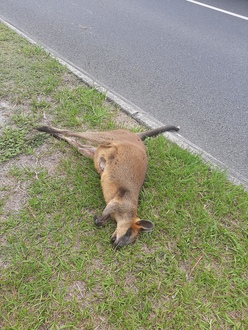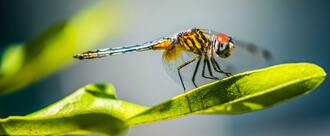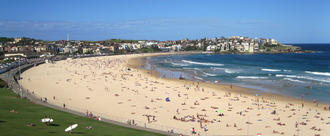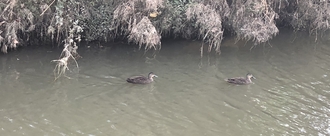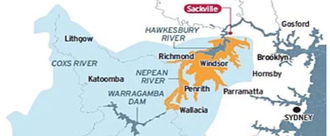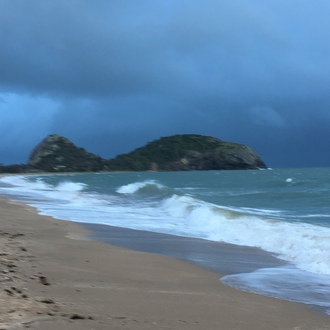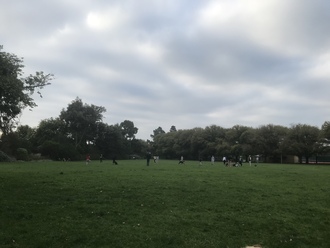-
Kangaroo Road Kills on Bribie IslandBribie Island is a flora and fauna sanctuary. Over one third of the island is National Park. Development has accelerated with little planning to cater for this unique Island and its natural flora and fauna. The local Council, Moreton Bay Regional Council does not have a plan specifically for the management of this unique and beautiful, but fragile Island. Kangaroos, Wallabies, snakes, birds and lizards are killed on the roads almost daily. The emus are now extinct on the island as a result of human impact. People move to Bribie Island for its "Liveability" The flora and fauna are part of that. People don't want to see dead kangaroos on the footpath outside the school or the Police euthanasing (shooting) a badly injured kangaroo in their front yard. This already happens too often. Development of the island must proceed with the fragile nature of the flora and fauna in mind: not at its expense. It will only get worse if nothing is done.669 of 800 SignaturesCreated by Ken Salisbury
-
Are you fogging kidding me? Let’s create a cleaner, chemically free Exmouth together.There are a number of reasons why we should ban fogging in Exmouth, Western Australia: 1. Fogging is ineffective - Fogging is only moderately effective in the control of the mosquito population. For each adult mosquito killed, many more larvae in the water remain unaffected. Fogging kills the adults and that gives temporary relief for the day. But the breeding source nearby is not affected, and the next day there will be more adults that can continue to breed and infect us. Reducing the number of larvae is a more effective measure, which means that oiling achieves better results than fogging. 0.1% of sprayed pesticides actually hit the target pest - 99.9 % go off into the environment (Pimentel, D. PhD., BioScience) The pesticides are actually negatively affecting our bird, bee (including native bee), and dragonfly population more than the mosquito population. The risks on our oceanic ecosystem and marine life is also largely unknown. 2. Fogging is toxic to our health - the pesticides used in vector control are neurotoxins and have been linked to adverse effects in humans. Ingredients used in mosquito fogging - malathion mixed with diesel - are powerful neurotoxins, carcinogenic and endocrine disruptors. Exposure to neurotoxins, even in low quantities, is also associated with numbness of the lips and tongue, nausea, headaches and respiratory problems. For these reasons, many countries have banned open-air fogging completely. Pregnant women, fetuses, infants, and children have a greater risk of getting sick from pesticides. Our children and grandchildren are exposed to these pesticides just by playing on our lawns once the fogging is complete. Airborne pesticides are particularly harmful as they may be easily ingested by humans and wildlife. Pesticide residue can also be left behind on items kept outdoors, such as children’s toys and outdoor furniture, or tracked inside on shoes. Children, the elderly, and the chronically ill are at greatest risk from chemically induced immune suppression. (World Resources Institute) Children have a greater risk of developing asthma by age five after pesticide exposure within the first year of life. 3. Fogging is also toxic to other insects and animals, such as butterflies, dragonflies and bees - these beautiful insects are particularly sensitive to pesticides. Malathion is highly toxic to bees and other beneficial insects, some fish, and other aquatic life. When bee populations are greatly affected by pesticides, food production in the area could be affected because of the lack of pollination. Pesticides are also harmful to many other animals, including those that are natural predators of mosquitoes. Most pesticides used in fogging are toxic to fish, which are very important for the eradication of mosquito larvae. Frogs, geckos and birds, which also eat mosquitoes, could also be affected by pesticides. We would like to suggest the following alternatives to fogging: 1. Responsible housekeeping and maintenance -Remove all sources of stagnant or standing water if possible. The eradication of breeding grounds in personal and commercial spaces are much more effective tools in the fight against Ross River virus and Barman Forest virus than widespread fogging is. 2. Relocating the budget to spending the money to destroy and control breeding zones, rather than on fogging. Safe alternatives exist such as garlic and cedar sprays which can last for a month. This should also decrease the current expense that the Health Department currently accrue. 3. Replacing pesticides with natural mosquito repellents such as garlic, peppermint or lemon oils or citrus-based sprays. Turpentine and eucalyptus oils, garlic extracts, surface oils, extracts of orange and lemon peel will all control mosquito larvae. Cinnamon Oil is better for repelling mosquitoes than what is being used. 4. Increasing community effort - The responsibility for eliminating breeding grounds in one’s own home and garden, while reporting possible breeding sites in public spaces to the relevant authorities, lies with everybody. We all need to play our part to keep the mosquito breeding grounds at bay. 5. Increasing and protecting the number of mosquito predators, such as dragonflies and bats, which are both highly effective ways of controlling mosquitoes naturally. The spraying of pesticides kills those natural predators as well as mosquitoes, and because mosquitoes have a shorter reproductive cycle than their predators, following every spraying there are more mosquitoes than there were before, as a number of studies have shown. If you need to control mosquitoes, do not spray; instead, remove standing water (in which mosquitoes breed) and consider introducing dragonflies to the area. Did you know: o A single bat can eat between 6000 to 8000 insects each night. o A single frog can eat over 100 insects in one night. o Dragonflies can eat 30 to 100s mosquitoes per day. The Exmouth Community are strongly advocating for the use of an effective and non-toxic method for reducing the risk of mosquito borne illnesses in Exmouth. Until a safer solution is researched and implemented, we are requesting that further fogging be put on hold.36 of 100 SignaturesCreated by Madeleine Doherty
-
Save Great Keppel IslandIn the last two election campaigns by our local MP Brittany Lauga, she has promised $25 million towards improvements to public amenities on GKI. These included a cyclone rate jetty, improvements to walking tracks and amenities for the public. To date non of these promises have be fulfilled. Instead, money has been used for useless studies such as "Decarbonising GKI" and $millions on a study to bring water and power to to GKI from the mainland. Where is the jetty and other promises? In the meantime Altum want the money ($30 Million) to build a marina on the most shallow beach on GKI. If they need $30 million to start construction it would be obvious to anyone but the State Government they can't pass due diligence for their Financial Capability to deliver anything on the GKI. Currently the "Woppaburra Land Trust" have a claim of Native Title over a significant part of the development proposal.39 of 100 SignaturesCreated by Tom Sjolund
-
No Beach Club on Bondi BeachThe proposed Amalfi Beach Club would privatise part of Bondi Beach and significantly damage the character of the beach. Bondi Beach is loved by locals and visitors to the area. We can't allow the construction of a private club on this most cherished public land.145 of 200 SignaturesCreated by Keri Spooner
-
Cleaning Dandenong CreekThe bird life and other wildlife that lives along and within the Dandenong Creek deserves a cleaner, cared for environment4 of 100 SignaturesCreated by Jeanette Walton
-
Flood Prevention in the ValleyA lot of energy has already been put into raising the height of the wall to “save the people” against "selfish" conservationists who want to save green space and indigenous heritage. The opposite seems closer to the truth with more development of lifeless hotboxes. The NSW Government will get more for their investment by financially supporting councils throughout the catchment to contain all runoff into wetlands, parks and ponds. This offers cooling amenity throughout western Sydney. Better for liveability for people, supposedly politician’s primary concern. Penrith should never be the hottest place on earth (https://www.sbs.com.au/news/sydney-s-penrith-the-hottest-place-on-earth-amid-devastating-bushfires). Keeping water in bodies of water like creek-lines, wetlands and ponds prevents bush fires by keeping the land cool, hydrated and ready to receive rain which it can hold rather than release into flood. Flood and drought are two sides of same operation. Hold onto rainwater (stops flood) and drought is prevented equally.10 of 100 SignaturesCreated by Sarah McLoughlin
-
Stop Land Clearing on the Capricorn CoastFor the preservation of flora and fauna. To reduce the planting of exotic species, which have high water needs, into new residential areas. To protect the reef and coastal areas from topsoil erosion from the total forest clearing in new developments2 of 100 SignaturesCreated by Roslyn Scott
-
Kyogle to Rainbow Ridge School BusAll children and their families should have access in our local area of Kyogle to a school bus to get to school. Rainbow Ridge Steiner School has been an education option for parents to send their children in Kyogle Council region for over 20 years and no school bus has ever been organised for their families from Kyogle township to the school. Over 20 children would use this bus service every week but still after years of petitioning by parents and the school to NSW transport, Kyogle Council and local MP's, no bus service to Kyogle. Our families are valuable in our local area and we should support our local schools in the Kyogle region.167 of 200 SignaturesCreated by DEBORAH MOORE
-
Safety for children and dogs in Ardrie ParkChildren and fur babies safety is extremely important. Excited children and puppies frequently dash towards the rear exit of Ardrie Park. Some run onto the road before parents can catch up.6 of 100 SignaturesCreated by Wendy Kurka
-
Safety for children and dogs in Ardrie ParkChildren and fur babies safety is extremely important. Excited children and puppies frequently dash towards the rear exit of Ardrie Park. Some run onto the road before parents can catch up. Cars often travel at speed along this road. Neighbours have witnessed scary near misses. A safety barrier and gate to prevent a likely traumatic accident is important.18 of 100 SignaturesCreated by Wendy Kurka
-
Save the NDISThe National Disability Services Scheme has changed many peoples lives including that of my daughter who is 12 and has Down syndrome. The planning role needs to sit with the National Disability Insurance Agency in order to preserve transparency of services. Little is being said about the partner LAC’s but recently my daughters plan moved from NDIA to APM. I was not informed and I have no choice it seems. This is not transparent and these partners look and act like the NDIA but they are contacted but the govt. My details were sent to them without my consent. Here is some of what has been written in the past. I just want to have the plan sit with the NDIA and not a contractor and that seems to have been removed from our control. Not choice and not control and not what the NDIS is about. Professionals who know a person with a disability need to provide input into support needs not an assessor who has never met the person and is contracted by the government to meet KPI's. References: https://www.google.com.au/amp/s/thewest.com.au/politics/inquiry-into-ndis-independent-assessments-c-2693586.amp https://www.themandarin.com.au/92967-investing-in-administration-matters-ombudsman-links-capacity-of-ndia-to-backlog-of-complaints/37 of 100 SignaturesCreated by Jane Ebert
-
Conserve Public Places in Clarence CityCommunity consultation is a long-standing issue within this City. Local people have concerns about rapid population increase, large developments and marked change to valued icons such as Kangaroo Bay, South Arm, Rosny Bowling Club, Bellerive Bluff, Rosny Golf Course and The Rosny Hill Nature Recreation Area,among others.33 of 100 SignaturesCreated by Denise Hoggan

